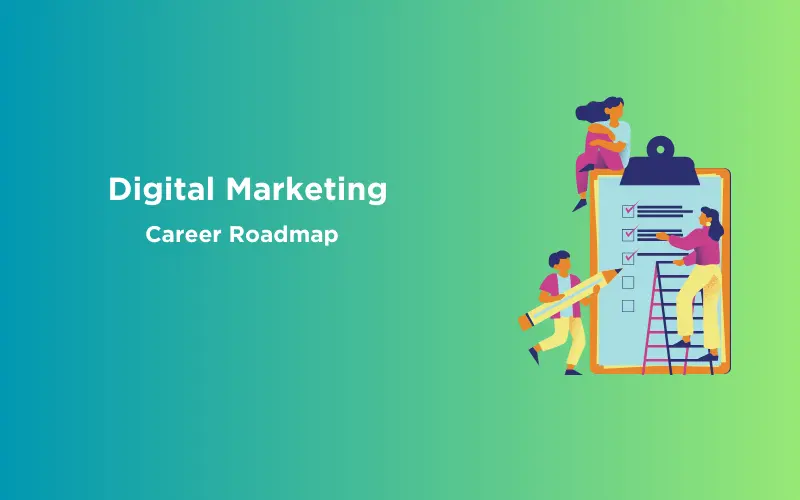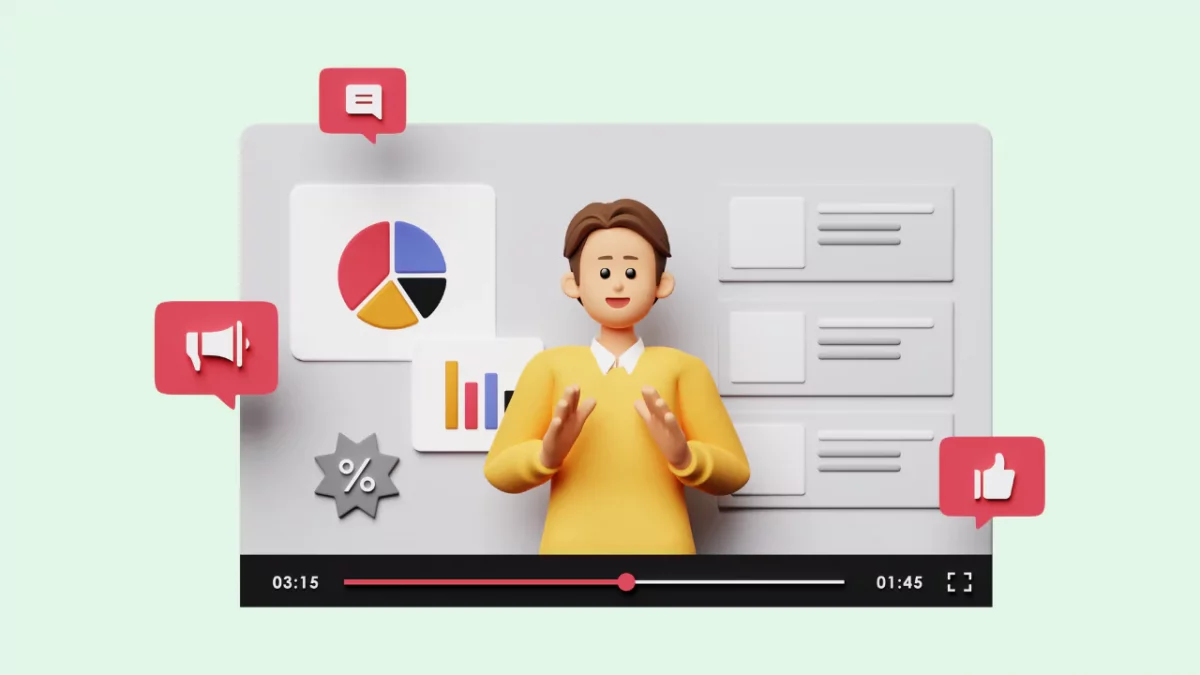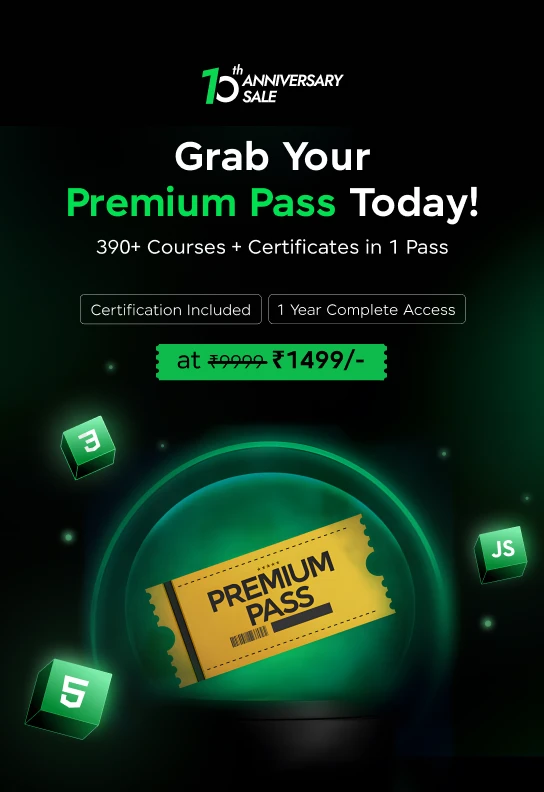
How to Become a Digital Marketer – Digital Marketing Career Roadmap
Apr 16, 2024 9 Min Read 1219 Views
(Last Updated)
Digital marketing is all about using the internet and technology to promote businesses and products. It’s a big deal in today’s world because so many people are online, and companies want to reach them. Because of this, there is a huge demand for people who know how to do digital marketing. The cool thing is that digital marketing has many different job opportunities, so you can find what you enjoy the most.
Imagine using social media, creating cool content, making websites show up on Google, and sending emails to attract customers. That’s what digital marketers do. Businesses need them to get noticed and sell their stuff online.
If you like being creative, using technology, and solving problems, digital marketing might be the perfect career for you. In this guide, we will show you the digital marketing career roadmap. You’ll learn the skills you need, build a strong network, and start an exciting journey in the world of digital marketing. Let’s get started!
Table of contents
- Step 1: Understand the Digital Marketing Landscape
- Email Marketing
- Data Analytics
- Step 2: Build a Strong Foundation
- Importance of Education
- Relevant Courses
- Certifications
- Online Resources
- Step 3: Acquire Practical Skills
- Significance of Hands-on Experience
- Internships
- Freelance Projects
- Personal Projects
- Step 4: Stay Updated with Industry Trends
- Dynamic Nature of Digital Marketing
- Suggested Resources to Stay Updated
- Step 5: Specialize in a Niche
- Benefits of Specialization
- Different Niches in Digital Marketing
- Step 6: Build a Strong Online Presence
- Importance of Personal Branding
- Tips for Building a Strong Online Presence
- Step 7: Network and Connect
- Value of Networking
- Tips for Effective Networking
- Step 8: Create a Portfolio
- Choose Your Best Work
- Provide Context
- Show Real Results
- Visual Appeal
- Include Personal Projects
- Add Recommendations
- Step 9: Apply for Digital Marketing Jobs
- Job Hunting Tips
- Tailor Your Resume and Cover Letter
- Apply for Entry-Level Positions
- Step 10: Continuous Learning and Growth
- Embrace Change
- Master New Skills
- Stay Ahead of the Curve
- Enhance Creativity
- Pursue Advanced Certifications and Courses
- Conclusion
- FAQs
- What skills do I need to become a digital marketer?
- Do I need a degree to work in digital marketing?
- How can I stand out as a digital marketer in a competitive job market?
Step 1: Understand the Digital Marketing Landscape

Digital marketing is like a big puzzle with many pieces. Let’s explore some of these pieces so you can see the whole picture:
- Social Media Marketing is about using platforms like Facebook, Instagram, and Twitter to connect with people and promote products.
- Creating interesting and useful content, like blog posts and videos, to attract customers and build trust.
- Making websites appear higher in Google search results so more people can find them.
- Paying for ads that appear on search engines or websites. You only pay when someone clicks on your ad.
Email Marketing
Sending emails to customers to tell them about new products or offers.
Data Analytics
This is like being a detective. You use data to understand what works and what doesn’t in digital marketing. It helps you make smart decisions.
Data analytics is super important because it helps digital marketers know if their strategies are working. By looking at numbers and data, they can see what’s popular, what’s not, and what they need to change.
Enrolling in GUVI’s Digital Marketing course can help you become an expert in the digital world, regardless of your level of marketing expertise. Learn the ins and outs of email marketing, social media marketing, content production, SEO, and more from professionals in the field. Through practical projects and real-world case studies, acquire job-ready skills with globally recognized certifications.
Additionally, if you want to explore Marketing Research Techniques through a Self-paced course, try GUVI’s Marketing Research Techniques Self-Paced certification course.
Step 2: Build a Strong Foundation

Having a strong foundation in marketing or related fields is like building a sturdy house. It gives you a solid base to start your digital marketing journey. Here’s what you can do:
Importance of Education
Having some knowledge of marketing or related subjects is super helpful. It gives you a head start and helps you understand the principles behind digital marketing.
Relevant Courses
You can take digital marketing courses online or at a college that cover topics like marketing, advertising, or communication. Look for courses that focus on digital marketing too.
Certifications
Some organizations offer certifications that show you have learned important digital marketing skills. Look for certifications from Google, HubSpot, or Facebook.
Online Resources
There are many digital marketing websites, blogs, and videos that offer free resources to learn about digital marketing. You can find tutorials, guides, and case studies to get started.
Remember, you don’t need a fancy degree to be a digital marketer. What matters is your willingness to learn and your passion for the field.
Step 3: Acquire Practical Skills

Learning by doing is one of the best ways to become a proficient digital marketer. It’s like riding a bike – you can read all about it, but you truly understand it when you actually pedal. Here’s why hands-on experience is essential:
Significance of Hands-on Experience
Digital marketing is a dynamic field where theory meets practice. By gaining hands-on experience, you get to apply what you’ve learned in real-life situations. It helps you understand how strategies work in the real world and how to adapt them to different scenarios.
Internships
Look for internships in digital marketing departments or agencies. This is an excellent way to learn from professionals, work on real projects, and get a feel for the industry.
Freelance Projects
Consider taking up freelance digital marketing projects. It allows you to work with clients, build your portfolio, and showcase your skills.
Personal Projects
Don’t be afraid to start your own projects! Create a blog, manage social media for a small business, or run an ad campaign for a personal project. It’s a great way to experiment and learn without any pressure.
Practical skills are what make you stand out as a digital marketer.
Step 4: Stay Updated with Industry Trends

In the world of digital marketing, change is constant, and staying updated is crucial to keep your skills sharp and relevant. Here’s why staying current is so important:
Dynamic Nature of Digital Marketing
New technologies, platforms, and strategies are constantly emerging. What worked yesterday may not work today. By staying updated, you can stay ahead of the curve and adapt to the ever-changing digital landscape.
Suggested Resources to Stay Updated
1. Industry Blogs: Follow reputable blogs that focus on digital marketing trends and insights. Blogs like Moz, Neil Patel’s blog, and Social Media Examiner regularly publish valuable content to keep you in the loop.
2. Podcasts: Listen to digital marketing podcasts during your commute or while exercising. Podcasts like “Marketing School,” “The Digital Marketing Podcast,” and “The Social Media Marketing Podcast” feature industry experts and provide valuable tips.
3. Conferences and Webinars: Attend industry conferences and webinars to learn from experts and network with like-minded professionals. Events like Social Media Marketing World and Content Marketing World are great opportunities to gain insights and stay updated.
4. Social Media: Follow industry leaders, influencers, and marketing experts on social media platforms like Twitter and LinkedIn. They often share the latest trends, news, and insights.
By proactively seeking out industry knowledge and staying updated, you’ll be better equipped to implement effective digital marketing strategies and adapt to changes in the digital world.
Step 5: Specialize in a Niche
Digital marketing is a vast field with many opportunities to explore. As you gain experience and knowledge, consider specializing in a particular area. Here’s why specializing can be beneficial:
Benefits of Specialization
Become an Expert: Specializing allows you to focus on a specific aspect of digital marketing, enabling you to become an expert in that area. Being an expert gives you a competitive advantage and makes you a valuable asset to employers or clients.
Deeper Knowledge: Instead of spreading yourself thin across different areas, you can dive deep into a niche. This deeper knowledge allows you to devise more effective strategies and deliver better results.
Increased Demand: Businesses often seek specialists who can tackle their specific challenges. By specializing, you make yourself more attractive to employers and increase your chances of landing your dream job or getting sought-after freelance projects.
Different Niches in Digital Marketing
Social Media Management: As a social media manager, you’ll create and implement social media strategies to engage audiences, build brand presence, and drive conversions.
SEO Optimization: SEO specialists work on improving website visibility in search engines. They optimize content and technical aspects to increase organic traffic.
Content Strategy: Content strategists plan and execute content marketing campaigns, ensuring content aligns with business goals and resonates with the target audience.
Email Marketing: Email marketers design and implement email campaigns to nurture leads and maintain customer relationships.
PPC Advertising: PPC specialists manage paid advertising campaigns, creating and optimizing ads to generate leads and conversions.
Analytics and Data Science: Data analysts in digital marketing interpret data to measure campaign performance, identify opportunities, and optimize marketing efforts.
Remember, choosing a niche doesn’t mean you’re stuck in it forever. You can always explore other areas as your career progresses. Start by identifying what you enjoy the most and where your strengths lie. By specializing, you can truly become a master in your chosen field and carve a successful path in the dynamic world of digital marketing.
Step 6: Build a Strong Online Presence

In the digital marketing world, your online presence is like your digital identity. It’s how you showcase your skills, expertise, and personality to the world. Here’s why personal branding is essential for a digital marketer:
Importance of Personal Branding
Differentiation: Digital marketing is a competitive field, and personal branding sets you apart from others. It highlights your unique strengths and what makes you special.
Credibility: A strong personal brand establishes trust and credibility with potential employers, clients, or partners. It shows that you know your stuff and can deliver results.
Visibility: Having a visible online presence makes it easier for people to find and connect with you. It opens doors to new opportunities and collaborations.
Tips for Building a Strong Online Presence
Start a Blog: A blog is an excellent way to showcase your expertise and share valuable insights. Write about topics related to your niche in digital marketing. Consistency is key, so aim to publish regularly.
Leverage Social Media: Use social media platforms like Twitter, Instagram, or Facebook to share your knowledge and engage with others in the industry. Share valuable content, participate in discussions, and build connections.
Optimize LinkedIn Profile: LinkedIn is a powerful platform for professional networking. Optimize your profile with a professional photo, a compelling summary, and a detailed list of your skills and experiences. Engage in relevant groups and contribute to discussions.
Create Engaging Content: Whether it’s blog posts, videos, infographics, or podcasts, focus on creating high-quality content that resonates with your audience. Share your content across social media platforms to increase visibility.
Be Consistent and Authentic: Be true to yourself and your brand. Consistency in your messaging and tone helps people recognize and remember you. Be authentic and show your personality; it makes you more relatable.
Engage with Your Audience: Respond to comments, messages, and emails promptly. Engaging with your audience fosters stronger connections and shows that you value their input.
Remember, building a strong online presence takes time and effort. Be patient and stay committed to your personal brand. As you grow your online presence, you’ll find that doors open, opportunities arise, and you establish yourself as a respected and influential figure in the digital marketing community.
Step 7: Network and Connect
In the digital marketing industry, networking is like building a web of connections that can lead to exciting opportunities and collaborations. Here’s why networking is so valuable:
Value of Networking
Opportunity Discovery: Networking exposes you to a broader range of opportunities. You may learn about job openings, freelance projects, or partnership possibilities that you wouldn’t have known otherwise.
Knowledge Sharing: Connecting with other professionals allows you to exchange ideas, insights, and best practices. Learning from others in the field can inspire creativity and help you stay updated with industry trends.
Professional Growth: Engaging with experienced marketers provides mentorship and guidance. You can learn from their successes and failures, which accelerates your professional growth.
Tips for Effective Networking
Attend Industry Events: Look out for conferences, workshops, and seminars related to digital marketing. These events bring together experts, thought leaders, and industry professionals, offering ample networking opportunities.
Join Online Communities: Participate in digital marketing forums, LinkedIn groups, or Facebook communities. Engaging in discussions, sharing your knowledge, and asking questions can establish you as an active and valuable member of the community.
Connect on Social Media: Follow and connect with digital marketing professionals on social media platforms like Twitter, LinkedIn, and Instagram. Engaging with their content and sharing your insights can foster meaningful connections.
Leverage Alumni Networks: If you’ve taken digital marketing courses or graduated from a relevant program, tap into your alumni network. Networking with alumni can lead to unique opportunities and shared experiences.
Attend Webinars and Virtual Events: In addition to physical events, take advantage of webinars and virtual conferences. These online events offer the chance to connect with professionals from around the world.
Offer Value to Others: Networking isn’t just about receiving; it’s also about giving back. Offer your expertise, help others solve problems, and be generous with your knowledge.
Remember, networking is not just about collecting business cards; it’s about building authentic relationships. Be genuine, show interest in others’ work, and be willing to invest time and effort into nurturing connections. By actively networking and connecting with professionals in the digital marketing industry, you’ll expand your horizons, gain insights, and open doors to exciting career opportunities.
Step 8: Create a Portfolio
A portfolio is like a showcase of your digital marketing talents. It’s a collection of your best work and projects that demonstrate your skills and expertise. Here’s how to create a compelling portfolio:
1. Choose Your Best Work
Select projects that showcase your abilities in various areas of digital marketing. Include examples of social media campaigns, content creation, SEO optimization, email marketing, and any other relevant work.
2. Provide Context
For each project, give a brief description of the goals, target audience, and strategies you used. Explain the challenges you faced and how you overcame them.
3. Show Real Results
If possible, include data and results from your campaigns. Metrics like increased website traffic, engagement rates, or lead generation will add credibility to your portfolio.
4. Visual Appeal
Design your portfolio in a clean and visually appealing manner. Use high-quality images, clear headings, and organized sections. Make it easy for potential employers or clients to navigate.
5. Include Personal Projects
If you don’t have enough professional experience, don’t worry. You can include personal projects, like managing your blog or social media channels. These show initiative and a passion for the field.
6. Add Recommendations
If you’ve worked with clients or collaborated with others, consider adding their testimonials or recommendations. Positive feedback from others enhances your credibility.
Importance of a Portfolio
A portfolio is a powerful tool for landing job opportunities in the digital marketing industry. Here’s why it’s so important:
1. Showcase Your Skills: Your portfolio is a visual representation of what you can do. It allows potential employers or clients to see your work and assess your abilities firsthand.
2. Stand Out from the Crowd: In a competitive job market, a well-crafted portfolio sets you apart from other candidates. It helps employers remember you and leaves a lasting impression.
3. Prove Your Results: By including data and real results in your portfolio, you demonstrate that your strategies lead to tangible outcomes. This builds trust in your capabilities.
4. Reflects Your Professionalism: A well-organized portfolio shows that you take your work seriously and have a professional approach to digital marketing.
Your portfolio is your personal marketing tool. Use it to tell your story, demonstrate your skills, and leave a positive impression on potential employers or clients.
Step 9: Apply for Digital Marketing Jobs

Congratulations! You’ve built a strong foundation, developed practical skills, and created an impressive portfolio. Now, it’s time to land that dream digital marketing job. Here are some tips to help you in your job-hunting journey:
1. Job Hunting Tips
Research Companies: Look for companies that align with your values and interests. Research their digital marketing efforts, company culture, and any recent news or achievements.
Networking Connections: Reach out to your network and let them know you’re on the lookout for a digital marketing position. They might have valuable leads or recommendations.
Use Job Boards: Check popular job boards like LinkedIn, Indeed, and Glassdoor for digital marketing job openings. Many companies post their vacancies on these platforms.
Company Websites: Visit the career pages of companies you are interested in. Sometimes, they advertise openings exclusively on their websites.
2. Tailor Your Resume and Cover Letter
Highlight Relevant Skills: Tailor your resume to showcase the digital marketing skills and experiences that are most relevant to the job you’re applying for. Use keywords from the job description.
Quantify Achievements: Whenever possible, quantify your achievements in your resume. Use numbers and data to demonstrate the impact of your work.
Showcase Your Portfolio: Include a link to your portfolio on your resume. This allows employers to see your work in more detail.
Customize Your Cover Letter: Address the cover letter to the hiring manager if possible. Mention why you are interested in the company and how your skills align with their needs.
3. Apply for Entry-Level Positions
Gain Experience: Entry-level positions are an excellent way to gain valuable experience and learn from seasoned professionals. Don’t underestimate the learning opportunities they provide.
Build Your Network: Working in an entry-level position allows you to connect with colleagues and industry professionals. These connections can be valuable for future growth.
Prove Your Potential: Even with limited experience, you can demonstrate your enthusiasm and willingness to learn. Show your potential to grow and contribute to the company’s success.
Applying to entry-level positions can be a stepping stone to bigger opportunities in the future. Many successful digital marketers started in entry-level roles and worked their way up. Embrace the learning experience, be persistent, and stay positive.
Step 10: Continuous Learning and Growth

Congratulations on starting your digital marketing journey! However, the learning doesn’t stop here. In the dynamic world of digital marketing, continuous learning is essential for staying relevant and thriving in your career. Here’s why lifelong learning matters:
1. Embrace Change
Digital marketing is constantly evolving. New technologies, algorithms, and trends emerge regularly. By staying updated, you can adapt to these changes and remain competitive.
2. Master New Skills
Continuous learning allows you to master new skills and techniques. As you add more skills to your arsenal, you become a versatile and sought-after digital marketer.
3. Stay Ahead of the Curve
Being a lifelong learner helps you stay ahead of your peers. Employers and clients value professionals who invest in self-improvement and are always up-to-date.
4. Enhance Creativity
Learning from different sources and industries can spark creativity. You can bring fresh ideas to your digital marketing strategies and stand out from the crowd.
5. Pursue Advanced Certifications and Courses
Specialize Further: Look for advanced certifications in your chosen niche. These certifications demonstrate your expertise and dedication in a specific area of digital marketing.
Stay Updated: Enroll in courses that cover the latest trends and technologies. Platforms like Coursera, Udemy, and HubSpot offer courses led by industry experts.
Gain Expert Insights: Seek out webinars and workshops conducted by thought leaders in the digital marketing field. Their insights can inspire you and provide valuable knowledge.
Invest in Yourself: Consider investing in higher education like a master’s degree or advanced diploma in digital marketing. This formal education can open up new career opportunities.
In the fast-paced world of digital marketing, continuous learning is the key to success. Embrace new challenges, seek out advanced certifications, and expand your expertise to stay relevant and competitive. Remember, the more you invest in your learning and growth, the more you’ll reap the rewards in your digital marketing career.
Join GUVI’s Digital Marketing Career Program to kickstart your journey in this exciting field. Gain expertise in ChatGPT, WordPress, Meta Business Suite, Google Analytics, Youtube Analytics, Google Ads Manager, and more. Master essential skills in SEO, social media marketing, email marketing, content creation, and digital advertising tactics to excel in the Digital Marketing industry.
Additionally, if you want to explore Marketing Research Techniques through a Self-paced course, try GUVI’s Marketing Research Techniques Self-Paced certification course.
Conclusion
Congratulations on learning about the digital marketing career roadmap!
To all future digital marketers, be persistent, flexible, and love learning. The digital marketing world has many opportunities for you. Follow your passion, keep growing, and enjoy a successful and fulfilling career in digital marketing! You’ve got this!
FAQs
What skills do I need to become a digital marketer?
To become a digital marketer, you’ll need a mix of creative and technical skills. Some essential skills include:
Social Media Management: Understanding how to engage and grow audiences on platforms like Facebook, Instagram, Twitter, etc.
Content Creation: Writing compelling copy, creating graphics, and making videos to attract and engage customers.
Search Engine Optimization (SEO): Optimizing websites to rank higher on search engines like Google.
Data Analytics: Analyzing data to measure the success of marketing campaigns and make data-driven decisions.
Email Marketing: Designing and executing email campaigns to reach and retain customers.
Paid Advertising: Managing paid ads on platforms like Google Ads and Facebook Ads.
Communication and Networking: Building relationships with clients, colleagues, and industry professionals.
Do I need a degree to work in digital marketing?
While a degree in marketing, business, or a related field can be beneficial, it’s not always necessary. Many digital marketers start with relevant courses, certifications, and practical experience. What matters most is your skills, passion, and willingness to learn. Employers often value hands-on experience and a strong portfolio over formal degrees.
How can I stand out as a digital marketer in a competitive job market?
Standing out in the digital marketing job market requires a combination of factors:
Specialization: Focus on a specific niche and become an expert in that area.
Continuous Learning: Stay updated with the latest trends, tools, and strategies in digital marketing.
Networking: Build connections in the industry through online communities, events, and social media.
Showcase Your Work: Create a compelling portfolio with your best projects and results.
Be Proactive: Take on personal projects or freelance work to gain experience and demonstrate your initiative.
Be Authentic: Showcase your personality and passion for digital marketing in your online presence.
By combining these elements, you can make yourself a standout candidate and increase your chances of landing your dream job in the competitive digital marketing field.





























Did you enjoy this article?